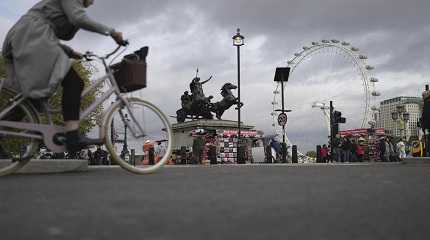
LONDON (AP) — Britain’s Conservative government on Friday defended its decision to hike taxes for millions of working people in the “squeezed middle” class as it tries to shore up an economy battered by double-digit inflation and the reckless tax-cutting of recently ousted Prime Minister Liz Truss.
An emergency budget announced by Treasury chief Jeremy Hunt on Thursday includes 25 billion pounds ($30 billion) in tax hikes, including higher income tax for middle and top earners and steeper local household taxes. The Treasury acknowledged that the moves will take taxes as a share of national income to its highest level since World War II.
The combination of high inflation – predicted to be 9.1% for 2022, largely driven by soaring energy costs from Russia’s invasion of Ukraine – and stagnating salaries means a 7% decline in U.K. living standards over the next two years, according to the Office for Budget Responsibility, the government’s fiscal watchdog.
“The truth is, we just got a lot poorer,” Paul Johnson, director of the Institute for Fiscal Studies think tank, said.
“We’re in for a long, hard, unpleasant journey,” he added, with “high borrowing, high debt, high tax and public spending under strain.”
Hunt reversed the billions of pounds in unfunded tax cuts announced by his predecessor Kwasi Kwarteng less than two months ago – a package that spooked financial markets, sent the pound plunging to a record low against the U.S. dollar and forced emergency intervention from the Bank of England.
Hunt also renounced the central principle touted by Kwarteng and Truss: that lower taxes are the key to economic growth.
“Sound money matters more than low taxes,” he said. “None of this is easy, but it’s the right thing to do.”
The emergency budget largely postponed public spending cuts until 2025 – after the next national election — and promised more money for key areas including education and health. Hunt also included help for British society’s most vulnerable, raising pensions and welfare benefits in line with inflation and boosting the minimum wage by 9.7%.
But millions of people in the U.K. face higher energy bills in the spring, when the government plans to cut back on support that has capped the average household’s utility bill at 2,500 pounds ($3,000) a year – more than double what it was a year ago. Bills are expected to increase to 3,000 pounds ($3,575) a year on average.
Hunt said the steps he was taking meant a predicted recession would be “shallower” than it otherwise would have been.
But some Conservatives grumbled that Hunt was abandoning the right-of-center party’s longstanding commitment to low taxes. And Friday’s headlines made bleak reading. “Carnage” was the Daily Mirror’s front-page verdict. The Metro blared “You’ve never had it so bad,” while the generally Conservative-supporting Daily Mail said accusingly: “Tories soak the strivers.”
Consumer affairs expert Martin Lewis said the worst is still to come for many people.
“Next spring, we are going to have this perfect storm of energy bills going up, cost of living continuing to rise and energy bills at their peak,” Lewis told radio station LBC. “My concern is what do we do to get people over that hump.”
Some Britons are worried but willing to give Hunt and Prime Minister Rishi Sunak – who took office last month after Truss was forced to resign over her botched budget – the benefit of the doubt.
“Things seem a lot calmer,” London resident Jo Thornton said. “I mean, it couldn’t have got any worse. So, fingers crossed. Rishi has my backing, I think he’s doing a good job. So, yeah, I wish him luck.”




